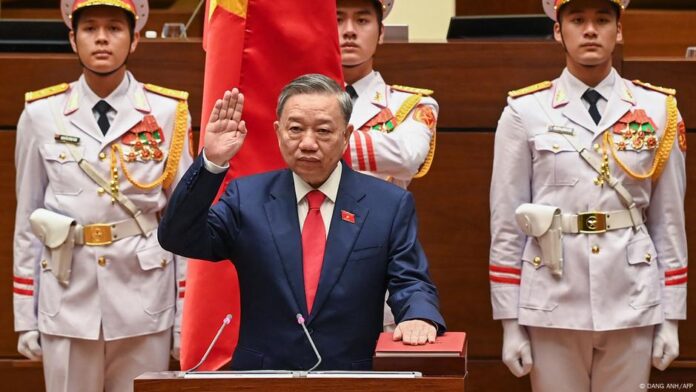Vietnam and Singapore agreed to elevate their ties to a comprehensive strategic partnership as Vietnamese leader To Lam visited the rich city-state last week.
Lam — general secretary of the Vietnamese Communist Party and the most powerful politician in Vietnam — held talks with Singaporean Prime Minister Lawrence Wong and other high-ranking officials about boosting economic and security cooperation between the two sides.
During the visit, both sides signed several agreements and discussed cooperation in undersea cable development, digital connectivity, and cross-border data flows.
Lam and Wong also discussed green development, industrial parks expansion, and peace and stability in the region, according to a joint statement.
Singapore invested over $10 billion in Vietnam last year
Both countries, members of the Association of Southeast Asian Nations (ASEAN) regional bloc, share close commercial relations. Bilateral trade amounted to $23.5 billion (€21.7 billion) last year, marking a 9.5% increase over the previous year.
Singapore also ranks among Vietnam’s top foreign investors, having invested around $10.2 billion last year. This accounted for 27% of Vietnam’s total foreign investment, according to official data.
Bich Tran, a postdoctoral fellow at the Lee Kuan Yew School of Public Diplomacy in Singapore, said Hanoi was trying to “elevate its international standing” by boosting ties with the island nation.
“Singapore offers investments and technological advancements in digital transformation and green transition,” she told DW.
Vietnam branches out
The move to elevate ties comes at a time of geopolitical turbulence in the wake of US President Donald Trump’s aggressive “America First” policies, including efforts to redirect global trade and investment flows and threatening to impose sweeping tariffs on economic partners.
Ja Ian Chong, assistant professor of political science at the National University of Singapore, said by strengthening ties with Vietnam, Singapore is trying to “mitigate uncertainties” caused by Washington’s pronouncements and actions.
“Singapore’s relations with Vietnam have been pretty good, especially economically. It is a big market. So an upgrade of ties mitigates some economic risk coming from US unpredictability,” he told DW.
Hanoi is focusing on “prioritizing partnerships with key neighbors and strengthening a network of regional alliances,” said Khac Giang Nguyen, a visiting fellow at the Vietnam Studies Program at the ISEAS — Yusof Ishak Institute in Singapore.
“For Vietnam, the real safeguard against geopolitical uncertainty lies in their ability to unite and deepen ties with like-minded nations, rather than depending on an unpredictable external power,” he added.
For the past decade, Vietnam has pursued a “bamboo diplomacy” strategy, which aims to balance relationships with all major powers.
However, the country remains embroiled in long-standing territorial disputes with China over the South China Sea, and Hanoi’s soft diplomatic touch is fueling public resentment in Vietnam. Many perceive it as a submissive stance towards an historical adversary.
In the past three years, the Vietnamese government has established comprehensive strategic partnerships with a host of countries, including Indonesia, Japan and South Korea, among others.
Shared interests
Lam, who became Vietnam’s top leader last August following the death of his predecessor Nguyen Phu Trong, has also pushed for closer ties with regional countries.
Zachary Abuza, a professor at the National War College in Washington, said Singapore is a “very appealing political model” for the Vietnamese leader.
“Lam is seeking to remake Vietnam from an ideological communist state, to one that is akin to Singapore’s pragmatic state-led autocracy,” he told DW.
At the same time, Singapore expects the partnership to enhance Vietnam’s defense capabilities, Abuza said. This would allow Hanoi to counter China’s growing military dominance in South China Sea’s disputed waters.
“Singapore clearly wants to see Vietnam develop economically to support a more robust military that can withstand Chinese bullying,” he underlined.
Edited by: Srinivas Mazumdaru

